NT
-
 Prof. Seong Publishes English Book on Reliability in Digital Control Systems
Prof. Poong-Hyun Seong of Department of Nuclear and Quantum Engineering has recently published an English-language book on reliability and risk issues in large scale safety-critical digital control systems used in complex facilities such as nuclear power plants.
The book entitled “Reliability and Risk Issues in Large Scale Safety-critical Digital Control Systems” is a result of Prof. Seong’s collaboration with some KAIST graduates who used to be under his guidance. The 303-page publication has been published by Springer, one of the world’s leading publishers of academic journals, as part of the Springer Series in Reliability Engineering.
The book consists of four parts; part I deals with issues related to hardware, part II software, part III human factors and finally the last part integrated systems. It can be purchased through some on-line book stores such as Amazon.com.
Prof. Seong served as an editor-in-chief for Nuclear Engineering and Technology (NET), an international journal of Korean Nuclear Society (KNS), from 2003 to 2008. He also worked as a chair of the Human Factors Division (HFD) of American Nuclear Society (ANS) from 2006 to 2007. Prof. Seong is now a commissioner of Korea Nuclear Safety Commission which is the nation’s highest committee on Nuclear Safety.
2008.12.26 View 19596
Prof. Seong Publishes English Book on Reliability in Digital Control Systems
Prof. Poong-Hyun Seong of Department of Nuclear and Quantum Engineering has recently published an English-language book on reliability and risk issues in large scale safety-critical digital control systems used in complex facilities such as nuclear power plants.
The book entitled “Reliability and Risk Issues in Large Scale Safety-critical Digital Control Systems” is a result of Prof. Seong’s collaboration with some KAIST graduates who used to be under his guidance. The 303-page publication has been published by Springer, one of the world’s leading publishers of academic journals, as part of the Springer Series in Reliability Engineering.
The book consists of four parts; part I deals with issues related to hardware, part II software, part III human factors and finally the last part integrated systems. It can be purchased through some on-line book stores such as Amazon.com.
Prof. Seong served as an editor-in-chief for Nuclear Engineering and Technology (NET), an international journal of Korean Nuclear Society (KNS), from 2003 to 2008. He also worked as a chair of the Human Factors Division (HFD) of American Nuclear Society (ANS) from 2006 to 2007. Prof. Seong is now a commissioner of Korea Nuclear Safety Commission which is the nation’s highest committee on Nuclear Safety.
2008.12.26 View 19596 -
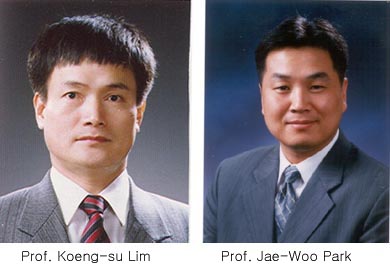 KAIST Scientists Creates Transparent Memory Chip
--See-Through Semis Could Revolutionize Displays
A group of KAIST scientists led by Prof. Jae-Woo Park and Koeng-Su Lim has created a working computer chip that is almost completely clear -- the first of its kind.
The new chip, called "transparent resistive random access memory (TRRAM), is similar in type to an existing technology known as complementary metal-oxide semiconductor (CMOS) memory -- common commercial chips that provide the data storage for USB flash drives and other devices. Like CMOS devices, the new chip provides "non-volatile" memory, meaning that it stores digital information without losing data when it is powered off. Unlike CMOS devices, however, the new TRRAM chip is almost completely clear.
The paper on the new technology, entitled "Transparent resistive random access memory and its characteristics for non-volatile resistive switching," was published in the December issue of the Applied Physics Letters (APL), and the American Institute of Physics, the publisher of APL, issued a press release about this breakthrough.
"It is a new milestone of transparent electronic systems," says researcher Jung-Won Seo, who is the first author of the paper. "By integrating TRRAM devices with other transparent electronic components, we can create a totally see-through embedded electronic system."
Technically, TRRAM devices rely upon an existing technology known as resistive random access memory (RRAM), which is already in commercial development for future electronic data storage devices. RRAM is built using metal oxide materials between equally transparent electrodes and substrates.
According to the research team, TRRAM devices are easy to fabricate and may be commercially available in just 3-4 years.
"We are sure that TRRAM will become one of alternative devices to current CMOS-based flash memory in the near future after its reliability is proven and once any manufacturing issues are solved," says Prof. Jae-Woo Park, who is the co-author on the paper. He adds that the new devices have the potential to be manufactured cheaply because any transparent materials can be utilized as substrate and electrode. They also may not require incorporating rare elements such as Indium.
2008.12.17 View 19420
KAIST Scientists Creates Transparent Memory Chip
--See-Through Semis Could Revolutionize Displays
A group of KAIST scientists led by Prof. Jae-Woo Park and Koeng-Su Lim has created a working computer chip that is almost completely clear -- the first of its kind.
The new chip, called "transparent resistive random access memory (TRRAM), is similar in type to an existing technology known as complementary metal-oxide semiconductor (CMOS) memory -- common commercial chips that provide the data storage for USB flash drives and other devices. Like CMOS devices, the new chip provides "non-volatile" memory, meaning that it stores digital information without losing data when it is powered off. Unlike CMOS devices, however, the new TRRAM chip is almost completely clear.
The paper on the new technology, entitled "Transparent resistive random access memory and its characteristics for non-volatile resistive switching," was published in the December issue of the Applied Physics Letters (APL), and the American Institute of Physics, the publisher of APL, issued a press release about this breakthrough.
"It is a new milestone of transparent electronic systems," says researcher Jung-Won Seo, who is the first author of the paper. "By integrating TRRAM devices with other transparent electronic components, we can create a totally see-through embedded electronic system."
Technically, TRRAM devices rely upon an existing technology known as resistive random access memory (RRAM), which is already in commercial development for future electronic data storage devices. RRAM is built using metal oxide materials between equally transparent electrodes and substrates.
According to the research team, TRRAM devices are easy to fabricate and may be commercially available in just 3-4 years.
"We are sure that TRRAM will become one of alternative devices to current CMOS-based flash memory in the near future after its reliability is proven and once any manufacturing issues are solved," says Prof. Jae-Woo Park, who is the co-author on the paper. He adds that the new devices have the potential to be manufactured cheaply because any transparent materials can be utilized as substrate and electrode. They also may not require incorporating rare elements such as Indium.
2008.12.17 View 19420 -
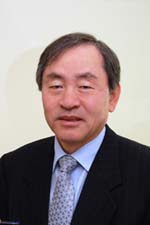 Prof. Cho Wins Best Paper Award
KAIST Prof. Nam-Zin Cho of the Department of Nuclear and Quantum Engineering, won the Best Thesis Award in the nuclear reactor physics category at the 2008 Winter Meeting of the American Nuclear Society held on Nov. 9-13 in Reno, Nevada.
His paper, entitled "Thermal Feedback Transient Analysis of a Pebble Fuel Based on the Two-Temperature Homogenized Model," was jointly authored by Hwi Yu and Jong-Un Kim under the guidance of Prof. Cho.
Prof. Cho was elected a fellow of the American Nuclear Society in 2001 and has served as the deputy editor of the Nuclear Science and Engineering, the research journal of the American Nuclear Society, since 1999.
2008.12.09 View 17112
Prof. Cho Wins Best Paper Award
KAIST Prof. Nam-Zin Cho of the Department of Nuclear and Quantum Engineering, won the Best Thesis Award in the nuclear reactor physics category at the 2008 Winter Meeting of the American Nuclear Society held on Nov. 9-13 in Reno, Nevada.
His paper, entitled "Thermal Feedback Transient Analysis of a Pebble Fuel Based on the Two-Temperature Homogenized Model," was jointly authored by Hwi Yu and Jong-Un Kim under the guidance of Prof. Cho.
Prof. Cho was elected a fellow of the American Nuclear Society in 2001 and has served as the deputy editor of the Nuclear Science and Engineering, the research journal of the American Nuclear Society, since 1999.
2008.12.09 View 17112 -
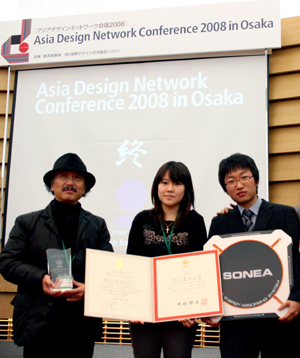 Prof. Kim's Team Wins Silver Prize at International Design Contest
A KAIST team led by Prof. Myung-Suk Kim of the Department of Industrial Design won a silver prize (given by the Mayor of Osaka) at the 17th International Design Competition held at the Osaka International Convention Center on Nov. 27.
The team, made up of KAIST students Da-Woon Chung (representative), Ji-Hoon Kim and Bo-Yeon Kim, presented a sonic energy absorbing (SONEA) system to transform noise energy into electrical energy. At the 2008 competition held under the main theme of "Earth-Life: Clean Aqua, Clean Air, Clean Energy," a Chinese team won the gold prize, Japanese and Korean groups shared silver prizes, and bronze prizes were given to U.S. and German contestants.
It was noteworthy that the KAIST team was the only undergraduate contestants who won the prize. Ji-hoon Kim had already won a bronze prize last year at the same competition.
The International Design Competition Osaka has been held annually or biannually, organized by the Japan Design Foundation, since 1983 and is considered as one of the most prestigious design competitions.
2008.12.09 View 17626
Prof. Kim's Team Wins Silver Prize at International Design Contest
A KAIST team led by Prof. Myung-Suk Kim of the Department of Industrial Design won a silver prize (given by the Mayor of Osaka) at the 17th International Design Competition held at the Osaka International Convention Center on Nov. 27.
The team, made up of KAIST students Da-Woon Chung (representative), Ji-Hoon Kim and Bo-Yeon Kim, presented a sonic energy absorbing (SONEA) system to transform noise energy into electrical energy. At the 2008 competition held under the main theme of "Earth-Life: Clean Aqua, Clean Air, Clean Energy," a Chinese team won the gold prize, Japanese and Korean groups shared silver prizes, and bronze prizes were given to U.S. and German contestants.
It was noteworthy that the KAIST team was the only undergraduate contestants who won the prize. Ji-hoon Kim had already won a bronze prize last year at the same competition.
The International Design Competition Osaka has been held annually or biannually, organized by the Japan Design Foundation, since 1983 and is considered as one of the most prestigious design competitions.
2008.12.09 View 17626 -
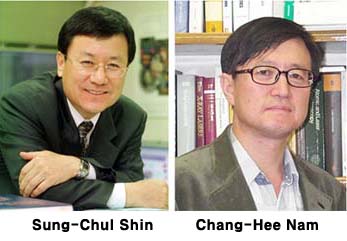 Two KAIST Professors Elected Fellows of APS
Profs. Sung-Chul Shin and Chang-Hee Nam of the Department of Physics, KAIST, have recently been elected the 2009 fellows of the American Physical Society (APS), university officials said on Tuesday (Dec. 2).
The APS fellowship is a prestigious recognition of the two professors" outstanding academic achievements in the field of physics, the officials said. The selection criteria are known to be extremely stringent and only a small fraction of APS members become fellows.
Prof. Shin was cited for his pioneering contributions to the understanding of magnetization reversal dynamics, in particular critical scaling behavior of Barkhausen avalanches of 2D ferromagnets, and discovery of novel magnetic thin films and multilayers for high-density data storage.
Prof. Nam was recognized for his contributions to the theory and experiments of physical processes of high harmonic generation for the development of attosecond coherent x-ray sources and related femtosecond laser technology.
The American Physical Society, founded in 1899, is the world"s second largest organization of physicists, behind the Deutsche Physikalische Gesellschaft. It has 46,000 members across the world.
2008.12.04 View 16860
Two KAIST Professors Elected Fellows of APS
Profs. Sung-Chul Shin and Chang-Hee Nam of the Department of Physics, KAIST, have recently been elected the 2009 fellows of the American Physical Society (APS), university officials said on Tuesday (Dec. 2).
The APS fellowship is a prestigious recognition of the two professors" outstanding academic achievements in the field of physics, the officials said. The selection criteria are known to be extremely stringent and only a small fraction of APS members become fellows.
Prof. Shin was cited for his pioneering contributions to the understanding of magnetization reversal dynamics, in particular critical scaling behavior of Barkhausen avalanches of 2D ferromagnets, and discovery of novel magnetic thin films and multilayers for high-density data storage.
Prof. Nam was recognized for his contributions to the theory and experiments of physical processes of high harmonic generation for the development of attosecond coherent x-ray sources and related femtosecond laser technology.
The American Physical Society, founded in 1899, is the world"s second largest organization of physicists, behind the Deutsche Physikalische Gesellschaft. It has 46,000 members across the world.
2008.12.04 View 16860 -
 2008 IEEE International Conference on Humanoid Robots Opens
The 2008 IEEE-RAS International Conference on Humanoid Robots, an international gathering to identify new research trends and technology in humanoid robotics, will open a three-day session on Monday (Dec. 1) at the Hotel Rivera and KAIST in Daejeon.
The annual conference is organized by KAIST and the Robotics and Automation Society of the Institute for Electric and Electronic Engineers, a U.S.-based international non-profit, professional organization for the advancement of technology related to electricity.
The conference is expected to draw a total of 200 robotics researchers from 19 different countries. Prof. Jun-Ho Oh, at the Department of Mechanical Engineering who led the creation of Korea"s first humanoid robot Hubo, is serving as general chair of the conference. Prof. Oh was named the host of the 2008 conference at the 2007 conference held at the Carnegie Melon University of the United States. The eight-year old conference was inaugurated in Boston in 2000.
On the opening day of Dec. 1, seven lectures will be given on diverse areas of robotics including cognitive humanoid vision, and robot vision sensor and sensing. On the subsequent two days, a total of 110 papers will be presented.
During the conference period, a variety of robots produced by six local and foreign robot makers will be on demonstration, providing opportunities for researchers and industrial robot makers to share technological ideas.
Highlights of the conference will be special lectures by world-renowned robot researchers Prof. Yoshiyuki Sankai of University of Tsukuba, who has created an exoskeletal "robot suit," and Prof. Art Kuo of Univerity of Michigan who is regarded as a leading authority in dynamic walking.
Following the conference, all participants are scheduled to tour Prof. Oh"s Hubo Lab and the Human-Robot Interaction Research Center, both located at KAIST.
2008.12.01 View 17797
2008 IEEE International Conference on Humanoid Robots Opens
The 2008 IEEE-RAS International Conference on Humanoid Robots, an international gathering to identify new research trends and technology in humanoid robotics, will open a three-day session on Monday (Dec. 1) at the Hotel Rivera and KAIST in Daejeon.
The annual conference is organized by KAIST and the Robotics and Automation Society of the Institute for Electric and Electronic Engineers, a U.S.-based international non-profit, professional organization for the advancement of technology related to electricity.
The conference is expected to draw a total of 200 robotics researchers from 19 different countries. Prof. Jun-Ho Oh, at the Department of Mechanical Engineering who led the creation of Korea"s first humanoid robot Hubo, is serving as general chair of the conference. Prof. Oh was named the host of the 2008 conference at the 2007 conference held at the Carnegie Melon University of the United States. The eight-year old conference was inaugurated in Boston in 2000.
On the opening day of Dec. 1, seven lectures will be given on diverse areas of robotics including cognitive humanoid vision, and robot vision sensor and sensing. On the subsequent two days, a total of 110 papers will be presented.
During the conference period, a variety of robots produced by six local and foreign robot makers will be on demonstration, providing opportunities for researchers and industrial robot makers to share technological ideas.
Highlights of the conference will be special lectures by world-renowned robot researchers Prof. Yoshiyuki Sankai of University of Tsukuba, who has created an exoskeletal "robot suit," and Prof. Art Kuo of Univerity of Michigan who is regarded as a leading authority in dynamic walking.
Following the conference, all participants are scheduled to tour Prof. Oh"s Hubo Lab and the Human-Robot Interaction Research Center, both located at KAIST.
2008.12.01 View 17797 -
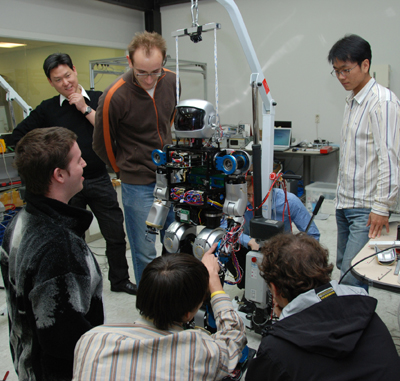 KAIST Collaborating with U.S. Universities to Advance Humanoid Robotics
Hubo, a life-size walking bipedal humanoid robot, is perhaps the best-known character in Korea that KAIST has ever produced. It was shown to the government heads of the Asia-Pacific region during the APEC held in Busan, Korea, in 2005 and appeared at the hit concerts of the pop singer Jang-Hoon Kim. The humanoid robot is soon likely to catch the fancy of Americans as a U.S. government-funded project seeks to create a Hubo that can work and interact with people in collaboration with Korean scientists.
"We are going to give the brains to Hubo. (Japanese) Asimo can do only pre-programmed actions. We want to create a Hubo that can help people, interact with people," said Prof. Paul Oh of the Department of Mechanical Engineering & Mechanics at Drexel University in Philadelphia and leader of the five-year international project which was launched in November 2007.
The U.S.$2.5 million project is funded through the Partnership for International Research and Education (PIRE) Program of the National Science Foundation (NSF) of the United States. It brings together world-renowned experts in humanoid design and information technologies.
"Dr. Jun-Ho Oh"s lab at KAIST (that has created Hubo) is the world"s leader in humanoid design and the U.S. has advanced technologies in the areas such as artificial intelligence, mechanical learning and robot vision. Combining the strengths of the two countries can create a synergy effect and develop a more advanced humanoid robot," said Paul Oh. He is currently serving as Program Director of Robotics of the NSF which is overseeing robotics research (non-military) in the U.S. consisting over 150 robotics faculty.
Paul Oh"s research team consists of experts from five U.S. universities -- Drexel, Bryn Mawr College, Colby College, the University of Pennsylvania and Virginia Tech -- and KAIST.
Leading a delegation of six professors and eight students, Dr. Paul Oh made a two-day visit to KAIST on Nov. 18-19 to review the progress of the project and have a technical meeting with participants.
"The U.S. universities participating in this program are scattered across the nation. So we decided to have a technical meeting here in Korea," he said.
Asked the reason why he chose KAIST as a partner for the program, Dr. Oh said that KAIST is willing to open Hugo to international researchers, whereas in Japan only Honda engineers are allowed to touch Asimo, which is a humanoid robot created by Honda Motor Company.
The project is to establish no barrier for roboticists anywhere in the world to pursue the humanoid research; a suite of humanoid platforms will be available for researchers to develop and advance capabilities like locomotion and human-robot interaction.
The team has been initially involved in development of three tools, all of which are based on the Hubo platform, in order to kick-start humanoid research in the U.S. They are the Mini-Hubo (a small, light-weight and affordable humanoid purchasable at the price lower than $8,000), On-Line Hubo (a program to operate Hubo online) and Virtual Hubo (a simulation program to do researches in cyberspace). As the first outcome of the project, the Mini-Hubo is expected to be released in the U.S. around next April.
Another important purpose of the PIRE program is to seek transformative models to train scientists and engineers to effectively work in global multi-disciplined design teams. To this end, an aggregate number of 20 students from U.S. universities are to stay at the KAIST during the next five years, with two students taking turns on a six-month term.
"I was really amazed how much work is done with small funding here. This is really an excellent example to learn," said Roy Gross, an undergraduate from Drexel who has been staying at Prof. Oh"s Lab for the past three months.
2008.11.21 View 21691
KAIST Collaborating with U.S. Universities to Advance Humanoid Robotics
Hubo, a life-size walking bipedal humanoid robot, is perhaps the best-known character in Korea that KAIST has ever produced. It was shown to the government heads of the Asia-Pacific region during the APEC held in Busan, Korea, in 2005 and appeared at the hit concerts of the pop singer Jang-Hoon Kim. The humanoid robot is soon likely to catch the fancy of Americans as a U.S. government-funded project seeks to create a Hubo that can work and interact with people in collaboration with Korean scientists.
"We are going to give the brains to Hubo. (Japanese) Asimo can do only pre-programmed actions. We want to create a Hubo that can help people, interact with people," said Prof. Paul Oh of the Department of Mechanical Engineering & Mechanics at Drexel University in Philadelphia and leader of the five-year international project which was launched in November 2007.
The U.S.$2.5 million project is funded through the Partnership for International Research and Education (PIRE) Program of the National Science Foundation (NSF) of the United States. It brings together world-renowned experts in humanoid design and information technologies.
"Dr. Jun-Ho Oh"s lab at KAIST (that has created Hubo) is the world"s leader in humanoid design and the U.S. has advanced technologies in the areas such as artificial intelligence, mechanical learning and robot vision. Combining the strengths of the two countries can create a synergy effect and develop a more advanced humanoid robot," said Paul Oh. He is currently serving as Program Director of Robotics of the NSF which is overseeing robotics research (non-military) in the U.S. consisting over 150 robotics faculty.
Paul Oh"s research team consists of experts from five U.S. universities -- Drexel, Bryn Mawr College, Colby College, the University of Pennsylvania and Virginia Tech -- and KAIST.
Leading a delegation of six professors and eight students, Dr. Paul Oh made a two-day visit to KAIST on Nov. 18-19 to review the progress of the project and have a technical meeting with participants.
"The U.S. universities participating in this program are scattered across the nation. So we decided to have a technical meeting here in Korea," he said.
Asked the reason why he chose KAIST as a partner for the program, Dr. Oh said that KAIST is willing to open Hugo to international researchers, whereas in Japan only Honda engineers are allowed to touch Asimo, which is a humanoid robot created by Honda Motor Company.
The project is to establish no barrier for roboticists anywhere in the world to pursue the humanoid research; a suite of humanoid platforms will be available for researchers to develop and advance capabilities like locomotion and human-robot interaction.
The team has been initially involved in development of three tools, all of which are based on the Hubo platform, in order to kick-start humanoid research in the U.S. They are the Mini-Hubo (a small, light-weight and affordable humanoid purchasable at the price lower than $8,000), On-Line Hubo (a program to operate Hubo online) and Virtual Hubo (a simulation program to do researches in cyberspace). As the first outcome of the project, the Mini-Hubo is expected to be released in the U.S. around next April.
Another important purpose of the PIRE program is to seek transformative models to train scientists and engineers to effectively work in global multi-disciplined design teams. To this end, an aggregate number of 20 students from U.S. universities are to stay at the KAIST during the next five years, with two students taking turns on a six-month term.
"I was really amazed how much work is done with small funding here. This is really an excellent example to learn," said Roy Gross, an undergraduate from Drexel who has been staying at Prof. Oh"s Lab for the past three months.
2008.11.21 View 21691 -
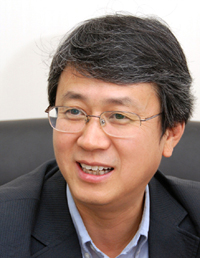 Method to Synthesize New Lithium Ion Battery Cathode Material Identified
A KAIST research team headed by Prof. Do-Kyung Kim at the Department of Materials Science and Engineering developed a technology to synthesize a new lithium ion battery spinel cathode which is regarded as a core part of hybrid and lithium battery cars.
The research was conducted in collaboration with a research team of Prof. Yi Cui at Stanford University"s Department of Chemistry. Their findings were introduced in the November issue of Nano Letters, one of the leading academic journals in nano-science.
The newly synthesized lithium ion battery spinel cathode known as spinel LiMn2O4 nanorods is attracting interests as an alternative cathode material since it is a low-cost, environmentally friendly substance for Li-ion battery cathodes. Its raw material is also highly available.
Lithium ion batteries with high energy and power density are important for consumer electronic devices, portable power tools, and vehicle electrification. LixCoO2 is a commonly used cathode material in commercial lithium iron batteries. However, the high cost, toxicity, and limited abundance of cobalt have been recognized to be disadvantageous.
2008.11.20 View 14644
Method to Synthesize New Lithium Ion Battery Cathode Material Identified
A KAIST research team headed by Prof. Do-Kyung Kim at the Department of Materials Science and Engineering developed a technology to synthesize a new lithium ion battery spinel cathode which is regarded as a core part of hybrid and lithium battery cars.
The research was conducted in collaboration with a research team of Prof. Yi Cui at Stanford University"s Department of Chemistry. Their findings were introduced in the November issue of Nano Letters, one of the leading academic journals in nano-science.
The newly synthesized lithium ion battery spinel cathode known as spinel LiMn2O4 nanorods is attracting interests as an alternative cathode material since it is a low-cost, environmentally friendly substance for Li-ion battery cathodes. Its raw material is also highly available.
Lithium ion batteries with high energy and power density are important for consumer electronic devices, portable power tools, and vehicle electrification. LixCoO2 is a commonly used cathode material in commercial lithium iron batteries. However, the high cost, toxicity, and limited abundance of cobalt have been recognized to be disadvantageous.
2008.11.20 View 14644 -
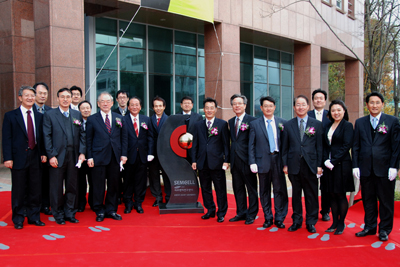 KAIST Opens Cell Bench Research Center
KAIST opened a cell bench research center on the campus on Monday, Nov. 17, as a joint project with Samsung Electric Co. and Samsung Medical Center.
On hand at the opening ceremony were about 100 persons from the three organizations, including KAIST President Nam-Pyo Suh, Samsung Electric"s Chief Technology Officer (CTO) Byung-Cheon Koh and Samsung Medical Center Vice President Hyo-Geun Lim.
The newly-opened research center will be involved in the development of individually-tailored anti-cancer medicine using bio-inspired cell chips and technologies for clinical applications. Prof. Young-Ho Cho of the Department of Bio and Brain Engineering was named director of the research center.
"Top-notch professionals from the electronic industry, academia and the medical community have gathered together to establish this research center. We expect the center will open a new path for the science and technology community and the industry to combine their strengths and develop innovative anti-cancer therapeutics," said KAIST President Nam-Pyo Suh at the opening ceremony.
"The development of bio-cell chip technology represents a new challenge for the Samsung Electric which has focused on information technologies thus far. Through cooperation with KAIST and Samsung Medical Center, we expect to be able to develop a simple and efficient cure for cancer patients," commented Samsung Electric CTO Byung-Cheon Koh.
The research center will be initially concentrating on the development of cell chips for lung cancer, one of the primary causes of death for Koreans.
2008.11.17 View 19028
KAIST Opens Cell Bench Research Center
KAIST opened a cell bench research center on the campus on Monday, Nov. 17, as a joint project with Samsung Electric Co. and Samsung Medical Center.
On hand at the opening ceremony were about 100 persons from the three organizations, including KAIST President Nam-Pyo Suh, Samsung Electric"s Chief Technology Officer (CTO) Byung-Cheon Koh and Samsung Medical Center Vice President Hyo-Geun Lim.
The newly-opened research center will be involved in the development of individually-tailored anti-cancer medicine using bio-inspired cell chips and technologies for clinical applications. Prof. Young-Ho Cho of the Department of Bio and Brain Engineering was named director of the research center.
"Top-notch professionals from the electronic industry, academia and the medical community have gathered together to establish this research center. We expect the center will open a new path for the science and technology community and the industry to combine their strengths and develop innovative anti-cancer therapeutics," said KAIST President Nam-Pyo Suh at the opening ceremony.
"The development of bio-cell chip technology represents a new challenge for the Samsung Electric which has focused on information technologies thus far. Through cooperation with KAIST and Samsung Medical Center, we expect to be able to develop a simple and efficient cure for cancer patients," commented Samsung Electric CTO Byung-Cheon Koh.
The research center will be initially concentrating on the development of cell chips for lung cancer, one of the primary causes of death for Koreans.
2008.11.17 View 19028 -
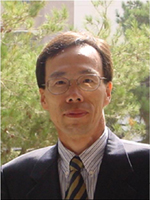 KAIST Research Team Unveils Method to Fabricate Photonic Janus Balls
A research team led by Prof. Seung-Man Yang of the Department of Chemical and Biomolecular Engineering has found a method to fabricate photonic Janus balls with isotropic structural colors.
The finding draws attention since the newly-fabricated photonic balls may prove useful pigments for the realization of e-paper or flexible electronic displays.
The breakthrough was published in the Nov. 3 edition of the science journal "Advanced Materials." The Nov. 6 issue of "Nature" also featured it as one of the research highlights under the title of "Future Pixels."
Prof. Yang"s research team found that tiny marbles, black on one side and colored on the other, can be made by "curing" suspensions of silica particles with an ultraviolet lamp. When an electric field is applied, the marbles line up so that the black sides all face upwards, which suggests they may prove useful pigments for flexible electronic displays.
The researchers suspended a flow of carbon-black particles mixed with silica and a transparent or colored silica flow in a resin that polymerizes under ultraviolet light. They then passed the mixture through a tiny see-through tube. The light solidified the silica and resin as balls with differently colored regions, each about 200 micrometers in diameter.
Over the last decades, the development of industrial platforms to artificially fabricate structural color pigments has been a pressing issue in the research areas of materials science and optics. Prof. Yang, who is also the director of the National Creative Research Initiative Center for Integrated Optofluidic Systems, has led the researches focused on fabrication of functional nano-materials through the process of assembling nano-building blocks into designed patterns.
The "complementary hybridization of optical and fluidic devices for integrated optofluidic systems" research was supported by a grant from the Creative Research Initiative Program of the Ministry of Education, Science & Technology.
2008.11.12 View 16874
KAIST Research Team Unveils Method to Fabricate Photonic Janus Balls
A research team led by Prof. Seung-Man Yang of the Department of Chemical and Biomolecular Engineering has found a method to fabricate photonic Janus balls with isotropic structural colors.
The finding draws attention since the newly-fabricated photonic balls may prove useful pigments for the realization of e-paper or flexible electronic displays.
The breakthrough was published in the Nov. 3 edition of the science journal "Advanced Materials." The Nov. 6 issue of "Nature" also featured it as one of the research highlights under the title of "Future Pixels."
Prof. Yang"s research team found that tiny marbles, black on one side and colored on the other, can be made by "curing" suspensions of silica particles with an ultraviolet lamp. When an electric field is applied, the marbles line up so that the black sides all face upwards, which suggests they may prove useful pigments for flexible electronic displays.
The researchers suspended a flow of carbon-black particles mixed with silica and a transparent or colored silica flow in a resin that polymerizes under ultraviolet light. They then passed the mixture through a tiny see-through tube. The light solidified the silica and resin as balls with differently colored regions, each about 200 micrometers in diameter.
Over the last decades, the development of industrial platforms to artificially fabricate structural color pigments has been a pressing issue in the research areas of materials science and optics. Prof. Yang, who is also the director of the National Creative Research Initiative Center for Integrated Optofluidic Systems, has led the researches focused on fabrication of functional nano-materials through the process of assembling nano-building blocks into designed patterns.
The "complementary hybridization of optical and fluidic devices for integrated optofluidic systems" research was supported by a grant from the Creative Research Initiative Program of the Ministry of Education, Science & Technology.
2008.11.12 View 16874 -
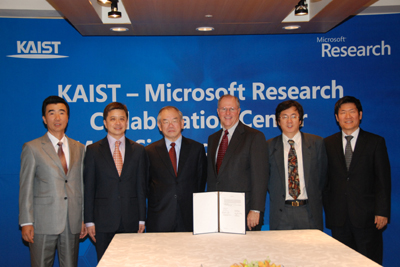 KAIST, Microsoft Research to Set up Research Collaboration Center
KAIST, Korea"s premier institution for science and technology research and education, and Microsoft Research (MSR), the research arm of Microsoft Corp, signed a memorandum of understanding (MOU) to establish a joint research collaboration center in Korea on Oct. 20.
The research collaboration center to be located at the KAIST campus in the Daedeok science and technology town 150 kilometers south of Seoul will be dedicated to promoting joint researches, curriculum innovation, talent fostering and academic exchange in the Asian region.
The MOU signing ceremony at the Westin Chosun Hotel in Seoul was attended by President Nam-Pyo Suh and Vice President Soon-Heung Chang from KAIST, and Craig Mundie, Chief Research and Strategy Officer of Microsoft Corp, and Hsiao-Wuen Hon, Managing Director of MSR Asia from Microsoft.
“We are excited to be working so closely with Microsoft Research,” KAIST President Suh said. “This is the first of many alliances we hope to establish with the world’s industrial leaders that will enable us to resolve some of the toughest problems in computer science and accelerate the next generation of innovation in computing technology and its application in other scientific researches.”
Dr. Hon said: “For over 10 years, Microsoft Research has been committed to working with leading universities throughout Asia to spur computer science research and to strengthen Asia’s knowledge economies by helping foster their capabilities. The Microsoft-KAIST Research Collaboration Center demonstrates our continued efforts to strengthen relations with universities in Korea and build new partnerships with academia here.”
In the last three years, Microsoft Research and KAIST have engaged in close collaboration through research projects, student support programs, and various academic exchange activities. One of the major projects was to construct software development library specifically dedicated to systems biology. A number of excellent students from KAIST participated in the internship program at Microsoft Research in Beijing, China and Redmond, United States.
The establishment of the Microsoft-KAIST research collaboration center will bring the collaborative relations between KAIST and MSR to a new level. The center will provide a platform which unites the innovative minds of KAIST and Microsoft Research to develop technologies that will impact the way people live, learn, work, and play, a KAIST spokesman said.
2008.10.30 View 19428
KAIST, Microsoft Research to Set up Research Collaboration Center
KAIST, Korea"s premier institution for science and technology research and education, and Microsoft Research (MSR), the research arm of Microsoft Corp, signed a memorandum of understanding (MOU) to establish a joint research collaboration center in Korea on Oct. 20.
The research collaboration center to be located at the KAIST campus in the Daedeok science and technology town 150 kilometers south of Seoul will be dedicated to promoting joint researches, curriculum innovation, talent fostering and academic exchange in the Asian region.
The MOU signing ceremony at the Westin Chosun Hotel in Seoul was attended by President Nam-Pyo Suh and Vice President Soon-Heung Chang from KAIST, and Craig Mundie, Chief Research and Strategy Officer of Microsoft Corp, and Hsiao-Wuen Hon, Managing Director of MSR Asia from Microsoft.
“We are excited to be working so closely with Microsoft Research,” KAIST President Suh said. “This is the first of many alliances we hope to establish with the world’s industrial leaders that will enable us to resolve some of the toughest problems in computer science and accelerate the next generation of innovation in computing technology and its application in other scientific researches.”
Dr. Hon said: “For over 10 years, Microsoft Research has been committed to working with leading universities throughout Asia to spur computer science research and to strengthen Asia’s knowledge economies by helping foster their capabilities. The Microsoft-KAIST Research Collaboration Center demonstrates our continued efforts to strengthen relations with universities in Korea and build new partnerships with academia here.”
In the last three years, Microsoft Research and KAIST have engaged in close collaboration through research projects, student support programs, and various academic exchange activities. One of the major projects was to construct software development library specifically dedicated to systems biology. A number of excellent students from KAIST participated in the internship program at Microsoft Research in Beijing, China and Redmond, United States.
The establishment of the Microsoft-KAIST research collaboration center will bring the collaborative relations between KAIST and MSR to a new level. The center will provide a platform which unites the innovative minds of KAIST and Microsoft Research to develop technologies that will impact the way people live, learn, work, and play, a KAIST spokesman said.
2008.10.30 View 19428 -
 SoC Robot War 2008 Wraps Up 4-Day Competition
The 2008 Intelligent SoC Robot War hosted by KAIST wrapped up its four-day competition on Sunday, Oct. 19, at the Indian Hall of Convention & Exhibition Center (COEX) in southern Seoul.
At the annual contest featuring battles between mechanical robots utilizing System on Chip (SoC) technology, Seoul National University of Technology"s "Fiperion" won top award in the Tank Robot category and Chungbuk National University"s "What is FPGA?" was the champion in the Taekwon Robot category.
In the Tank Robot contest, robots in the form of tanks engaged in duels with laser beams through visual recognition, wireless communication, and audio recognition. On the other hand, the Taekwon Robot contest was a hand-to-hand fight. The robots had to be capable of recognizing the opponent, defending and attacking without external control.
A total of 20 teams in the Tank Robot category and 10 teams in the Taekwon Robot category passed through the preliminary assessments and vied in the final competition. The annual event started seven years ago.
The preliminary assessments conducted between July and September drew a total of 150 teams nationwide. Any team consisting of more than two people and under six undergraduate or graduate students are eligible to take part in the competition.
This year"s event was co-sponsored by Altera, a U.S.-based leading semiconductor manufacturer. Each of the two top-award winning teams received U.S.$1,000 in cash and 10 pieces of DE2 board which is worth $2,700.
2008.10.22 View 12310
SoC Robot War 2008 Wraps Up 4-Day Competition
The 2008 Intelligent SoC Robot War hosted by KAIST wrapped up its four-day competition on Sunday, Oct. 19, at the Indian Hall of Convention & Exhibition Center (COEX) in southern Seoul.
At the annual contest featuring battles between mechanical robots utilizing System on Chip (SoC) technology, Seoul National University of Technology"s "Fiperion" won top award in the Tank Robot category and Chungbuk National University"s "What is FPGA?" was the champion in the Taekwon Robot category.
In the Tank Robot contest, robots in the form of tanks engaged in duels with laser beams through visual recognition, wireless communication, and audio recognition. On the other hand, the Taekwon Robot contest was a hand-to-hand fight. The robots had to be capable of recognizing the opponent, defending and attacking without external control.
A total of 20 teams in the Tank Robot category and 10 teams in the Taekwon Robot category passed through the preliminary assessments and vied in the final competition. The annual event started seven years ago.
The preliminary assessments conducted between July and September drew a total of 150 teams nationwide. Any team consisting of more than two people and under six undergraduate or graduate students are eligible to take part in the competition.
This year"s event was co-sponsored by Altera, a U.S.-based leading semiconductor manufacturer. Each of the two top-award winning teams received U.S.$1,000 in cash and 10 pieces of DE2 board which is worth $2,700.
2008.10.22 View 12310